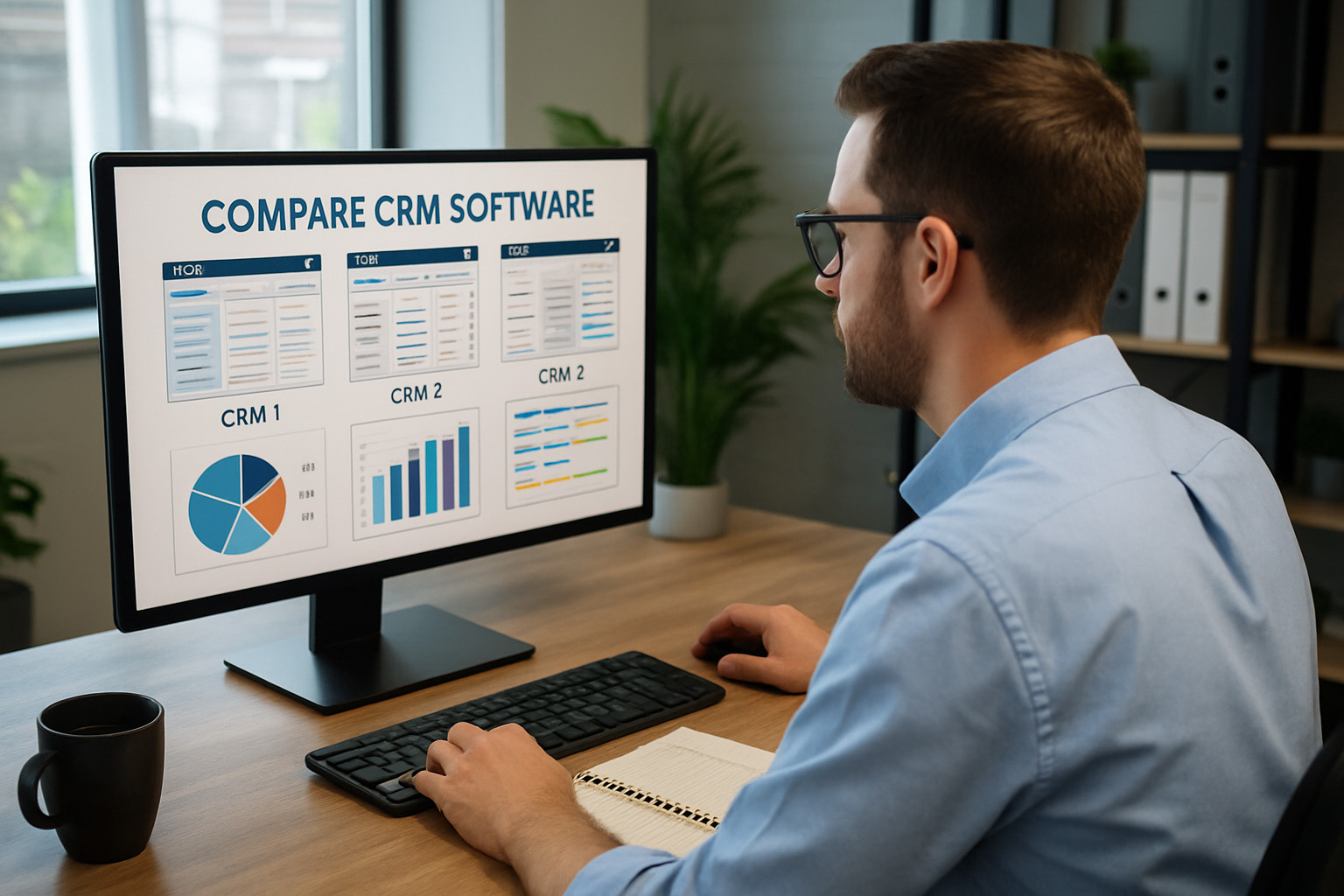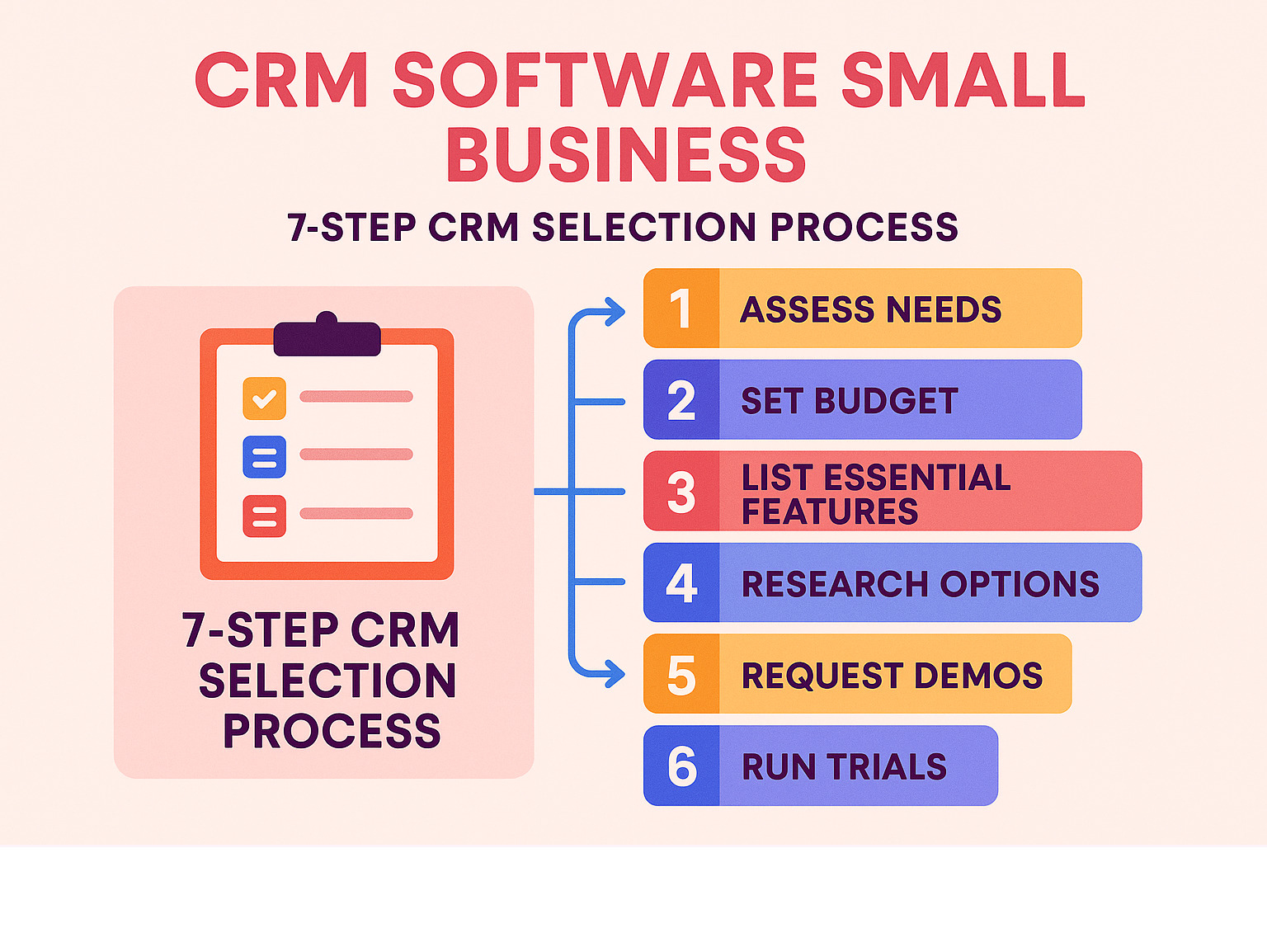The Small Business CRM Revolution: Tools That Spark Growth
CRM software small business solutions have evolved dramatically in recent years, making powerful customer relationship tools accessible to companies of all sizes. If you’re looking for the right CRM for your small business, here are the top-rated options in 2024:
| CRM Solution | Best For | Starting Price | Key Feature |
|---|---|---|---|
| Less Annoying CRM | Overall simplicity | $15/user/month | Truly small-business focused |
| Zoho CRM | Automation & value | $14/user/month | Built-in AI capabilities |
| HubSpot CRM | Marketing integration | Free (basic) | Comprehensive free tier |
| Bigin by Zoho | Ultra-affordable | $7/user/month | Easy pipeline management |
| Pipedrive | Visual sales pipeline | $15/user/month | Intuitive drag-and-drop interface |
Running a small business means wearing multiple hats while trying to keep everything organized. As your customer base grows, spreadsheets and sticky notes quickly become inadequate. That’s where CRM software comes in.
According to our research, small businesses using CRM software report impressive results:
– 29% boost in sales
– 34% increase in productivity
– 42% improvement in forecast accuracy
The days when CRM systems were exclusively for large enterprises with deep pockets are long gone. Today, 99.9% of all businesses in the US qualify as small businesses, and CRM vendors have responded by creating affordable, user-friendly solutions custom to their needs.
Whether you’re looking to organize contacts, automate follow-ups, or visualize your sales pipeline, the right CRM can transform how you manage customer relationships and drive growth—without requiring a degree in software engineering to set up.

Why Every Small Business Needs a CRM
Let’s be honest – as a small business owner, you’re already juggling a dozen roles. From CEO to sales rep to office manager, your plate is perpetually full. That’s exactly why a CRM isn’t just nice to have – it’s becoming essential for businesses of all sizes.
Small businesses are the backbone of our economy, creating two-thirds of new American jobs and generating 54% of U.S. sales. Yet many entrepreneurs still wonder if a CRM system is really worth the investment.
The short answer? Absolutely.
Think about your current system. Customer information scattered across emails, notes jotted on Post-its, and that spreadsheet you haven’t updated in weeks. A CRM changes all that by creating one searchable home for every customer interaction, quote, and follow-up note.
The numbers tell a compelling story. According to recent research, 63% of small and mid-size business leaders report that a CRM helps them deliver better and faster customer service. When you can instantly pull up a customer’s history, preferences, and past conversations, you create the kind of personalized experience that turns occasional buyers into loyal advocates.
Small businesses using CRM software small business solutions see remarkable results:
– A whopping 300% increase in conversion rates
– $8.71 return for every dollar invested in CRM implementation
– 47% higher customer retention rates
The Cost of Doing Nothing
“We’re too small for a CRM” or “It’s an unnecessary expense right now” – I hear these objections frequently. But postponing this decision comes with hidden costs that can seriously impact your growth.
When you skip implementing a CRM, you’re essentially accepting several business risks:
First, missed follow-ups. We’ve all been there – a hot lead contacts you, you mean to follow up, but it slips through the cracks during a busy week. A CRM ensures this doesn’t happen with automated reminders and clear ownership of each lead.
Second, siloed information. When customer data lives only in your sales rep’s inbox or personal notes, what happens when they leave? That institutional knowledge walks right out the door. A CRM creates a permanent record that belongs to your business, not individual employees.
Third, increased churn risk. Without visibility into customer interaction patterns, you can’t spot at-risk relationships before they’re gone. CRMs help flag inactive accounts so you can proactively reach out before losing a customer.
Finally, inefficient processes eat away at your productivity. Manual data entry and searching for information wastes precious time that could be spent on growth activities.
The scientific research on SMB statistics confirms what many successful entrepreneurs already know: investing in the right tools early pays dividends as your business expands.
Key Features to Look For in CRM Software Small Business Teams Love

When you’re running a small business, not all CRM solutions will fit your unique needs. After helping hundreds of entrepreneurs find their perfect match, I’ve identified the features that truly make a difference in day-to-day operations.
Must-Have #1 – Simple Setup & UX
I can’t stress this enough: if your team finds the software frustrating, they simply won’t use it. User adoption is the number one reason CRM implementations succeed or fail.
The best CRM software small business options offer an intuitive interface where new team members can steer without extensive training. Look for solutions promising quick setup measured in hours, not weeks. You’ll want something customizable but simple enough that you can adapt fields and workflows without needing to write code.
And don’t forget about mobile access—99% of IT leaders believe business survival depends on mobile enablement. Your team needs to update records and access customer information whether they’re at their desk or meeting clients in the field.
Must-Have #2 – Automation & Templates
This is where the magic happens. Automation delivers the biggest ROI for small businesses using CRMs, with 64% of SMB leaders rating these capabilities as extremely important.
Your CRM software small business solution should include email templates for common communications, follow-up sequences that automatically schedule emails based on customer actions, and task creation features that generate to-dos when deals change stages.
Lead scoring helps automatically prioritize prospects based on engagement, while data entry automation reduces manual input by capturing information from emails and web forms.
The time savings are substantial—one business owner I worked with reclaimed 5 hours every week through automation alone. Another saw their lead conversion rate jump by 35% after implementing automated follow-up sequences.
Must-Have #3 – Integrations That Matter
Your CRM shouldn’t live in isolation. It should play nicely with all the other tools your business relies on daily.
Email integration with Gmail or Outlook ensures communications sync automatically, while calendar tools let you schedule meetings without app-switching. Connections to your marketing platforms bring together email campaigns, social media, and web analytics in one place.
Don’t overlook integrations with your accounting software to link invoices and payments to customer records, or with your e-commerce platforms to track purchase history and customer behavior.
| Integration Type | Benefits | Implementation Complexity |
|---|---|---|
| Native Integrations | Pre-built, reliable, often included | Low – typically plug-and-play |
| API Connections | Customizable, powerful | Medium – may require technical help |
| Webhook Automations | Real-time data syncing | Medium-High – technical setup needed |
| Zapier/Middleware | Connect almost anything | Low-Medium – template-based setup |
Must-Have #4 – Reporting & Dashboards
Data without insights is just noise cluttering your screen. Your CRM should transform numbers into actionable strategy through visual pipelines with drag-and-drop interfaces to track deals through stages.
Look for customizable dashboards that match your specific business metrics and real-time reporting that gives you up-to-the-minute data on sales activities. Goal tracking features help you set and monitor progress toward revenue targets.
The right reporting tools don’t just tell you what happened yesterday—they help you predict and shape what will happen tomorrow. That foresight is invaluable for small businesses operating with limited resources.
Want to explore more startup tech tools that can complement your CRM? Check out our comprehensive guide to tech tools for growing businesses.
Choosing the Best Fit: CRM Categories & Decision Framework

With hundreds of CRM options out there, finding your perfect match can feel overwhelming. To make your life easier, I’ve broken down the main CRM categories that small businesses typically consider:
Budget-Friendly CRMs focus on giving you the essentials without breaking the bank. Solutions like Less Annoying CRM and Bigin by Zoho strip away unnecessary complexity and deliver core functionality at affordable prices.
Action-Focused CRMs like OnePageCRM emphasize task management and follow-up processes—perfect if your team needs help staying on track with customer communications.
AI-Powered CRMs represent the cutting edge, with platforms like Zoho CRM using artificial intelligence to suggest next steps, predict outcomes, and automate routine tasks.
Industry-Specific CRMs are custom to particular sectors such as real estate, healthcare, or professional services. These specialized tools come pre-configured with workflows that match your typical customer journey.
Freemium CRMs like HubSpot offer robust free tiers that can grow with your business. They’re perfect for bootstrapping entrepreneurs who need professional tools but aren’t quite ready for a paid subscription.

CRM Software Small Business Comparison Criteria
When comparing options, look beyond the flashy marketing. Here’s what to focus on:
The pricing model can significantly impact your total cost. Most CRM software small business solutions use per-user pricing (typically $7-$35 per user monthly for basic plans), but watch for platforms that charge based on tiered feature packages, contact limits, or offer free cores with paid add-ons.
Factor in implementation time, training hours, integration costs, and potential customization needs. That “affordable” option might end up costing more if it requires expensive third-party add-ons.
Pay attention to user limits and scalability. Will you face penalties for adding or removing users as your team fluctuates? What happens when you outgrow your current tier?
Don’t underestimate the value of good support options. The availability of live chat, email, or phone support can make or break your experience, especially during initial setup.
How to Run a 30-Day Trial Like a Pro
Almost every CRM software small business solution offers a free trial, but few entrepreneurs know how to make the most of this evaluation period.
Start by setting clear goals for what success looks like. Are you primarily focused on contact organization, sales pipeline visibility, or automated follow-ups?
Don’t test with dummy data—import real contacts and deals (at least a subset) to see how the system handles your actual information.
Make sure to involve key users from day one. The perfect CRM in your eyes might be frustrating for your sales team or administrative staff.
Take time to test critical workflows by running through your most common sales processes from start to finish. Does the CRM match how your team actually works?
Don’t forget to evaluate the mobile experience. Test the app in real-world scenarios—can you quickly log a call after meeting a prospect? Update a deal while waiting for your coffee?
Finally, test support responsiveness by submitting questions through various channels. Fast, helpful responses during the trial period are usually a good indicator of the support you’ll receive as a paying customer.
Implementation, Integration & Scaling Tips
You’ve chosen your CRM—congratulations! But now comes the part that many small business owners find challenging: actually making it work for your team. With some thoughtful planning, your implementation can be smooth sailing.
Start by cleaning your existing data. Those dusty spreadsheets probably contain duplicate contacts, outdated information, and inconsistent formatting. Taking time to clean this data before migration will save you countless headaches later.
Next, map out your current sales processes on paper. Understanding how leads flow through your business today helps configure your CRM to match your real-world needs, not some generic template.
“Model commitment—lead by example in consistent CRM usage,” advises one implementation expert. When your team sees you actively using the system, they’re far more likely to accept it themselves.
Remember to start simple. You don’t need to implement every bell and whistle on day one. Master the basics, get comfortable, then gradually add more sophisticated features as your team’s confidence grows.

Integration Playbook for Maximum Value
A standalone CRM is helpful, but a connected CRM is transformative. Think of integrations as building bridges between islands of information in your business.
Email and calendar synchronization should be your first priority. When your CRM automatically captures client communications and meetings, nothing falls through the cracks.
Marketing automation integration creates a seamless handoff between marketing and sales. When a lead fills out a form on your website, they can be automatically added to your CRM, scored based on their behavior, and assigned to the right salesperson.
“Make the most of third-party integrations,” suggests one CRM consultant. “They create a unified data ecosystem that eliminates manual data transfer and provides a 360-degree customer view.”
Don’t overlook connecting your e-commerce platform and accounting software too. When purchase history and payment status live in your CRM, your team can have more informed conversations with customers.
For more insights on building lasting relationships with customers through technology, check out our guide on Building Lasting Business Relationships.
Growing Pains: When to Level Up Your CRM
Even the perfect CRM today might not be perfect tomorrow as your business evolves. Pay attention to these growth signals that suggest it’s time to level up:
When your user count approaches your plan’s limits, it’s a clear indicator of expansion needs. But watch for subtler signs too—like team members creating workarounds because the system can’t handle their increasingly complex workflows.
Reporting limitations become apparent when basic dashboards no longer answer your strategic questions. As your business matures, you’ll want deeper insights into customer behavior and sales team performance.
Performance issues like slow load times or frequent timeouts indicate your data volume may be outgrowing your current solution’s capabilities.
“Plan for scalability by selecting vendors with clear upgrade paths,” recommends one small business advisor. Many small businesses start with streamlined solutions like Bigin by Zoho CRM ($7/user/month) and graduate to more robust platforms like Zoho CRM ($14/user/month) as they scale, maintaining data continuity while gaining advanced features.
Frequently Asked Questions about CRM Software Small Business Owners Ask
What does a CRM actually do for a small business?
At its heart, a CRM serves as your business’s relationship memory bank. It creates a single home for all your customer information, conversations, and history.
Think of it as your business’s brain for relationships. Instead of trying to remember that Jane Smith has two kids in college and last purchased in March, or hunting through old emails to find what you promised Bob last month, it’s all there at your fingertips.
For small businesses specifically, a CRM transforms how you connect with customers by:
Keeping all contact details organized, tracking every email and call automatically, showing exactly where deals stand in your sales pipeline, nudging you when it’s time to follow up, revealing patterns in your sales data, and giving your team the full picture when helping customers.
As one business owner shared: “Our CRM software small business solution freed my sales team from drowning in paperwork so they could get back to what they do best – actually selling and building relationships.”
How much should I budget per user per month?
Let’s talk money – because budget matters when you’re running a small business. The good news is that CRM systems now come at price points for nearly every budget:
For basic needs, expect to pay around $7-15 per user each month. These entry-level options typically cover contact management, basic pipelines, and simple task tracking.
Mid-tier options ($15-35 per user/month) add more automation, reporting, and integration capabilities.
Advanced systems ($35-65+ per user/month) bring sophisticated workflows, AI features, and enterprise-grade tools.
But here’s what many vendors won’t tell you upfront: the sticker price isn’t the whole story. When budgeting, remember to factor in the hidden costs: time spent setting everything up, training your team, connecting other software tools, and any premium features you might need to add later.
How hard is it to migrate data from spreadsheets?
The good news is that modern CRM software small business platforms have made this process much more manageable than it was even five years ago.
Most CRMs today offer user-friendly import tools that can handle standard spreadsheet formats. The process typically flows like this:
First, you’ll clean up your existing data (this is actually the most time-consuming part – finding duplicates, standardizing formats, filling gaps). Then you’ll match your spreadsheet columns to the CRM’s fields, run a small test batch to make sure everything maps correctly, complete the full import, and finally verify that everything transferred properly.
What I’ve learned from helping businesses make this transition is that the technical part rarely causes problems. The real challenge is organizational – making sure your data is clean and consistent before you move it.
Some CRMs go above and beyond with migration tools – Zoho’s aptly named “Zwitch” feature enables one-click migration from spreadsheets or even competitor CRMs. Many providers also include migration assistance as part of their onboarding process.
Conclusion & Next Steps

In today’s competitive landscape, having the right CRM software small business solution isn’t just a nice-to-have anymore. It’s essential. Throughout this guide, we’ve seen how CRMs deliver real, measurable improvements that directly impact your bottom line: boosting sales, enhancing productivity, and keeping those valuable customers coming back.
The good news? The CRM world continues to evolve in your favor. AI capabilities that were once the exclusive domain of big corporations with massive budgets are now within reach for small businesses like yours. These smart tools can predict which leads are most likely to convert, suggest your best next move with a customer, and handle those repetitive tasks that eat up your precious time.
Want to make sure your CRM investment stands the test of time? Start with what you need right now, but choose a system that can grow alongside your business. Even the most powerful CRM on the planet won’t help if your team avoids using it. Look for something with an intuitive interface that won’t leave everyone scratching their heads.
From day one, connect your CRM to the other tools that power your business. This integration habit pays dividends almost immediately. And don’t just set it and forget it—regularly check in on how your team is using the system and what results you’re seeing.
“Early CRM adoption shapes work habits and makes team onboarding smoother as the business grows,” as one expert perfectly put it. This isn’t a one-and-done project—it’s an ongoing journey that evolves as your business does.
Here at TheEntrepreneurs.net, we’re passionate about helping small business owners like you harness technology to fuel growth. Whether you’re dipping your toes into the CRM waters for the first time or looking to upgrade your current system, making the right choice can transform your customer relationships and put your business growth on the fast track.
Ready to take that next step? Begin by honestly assessing your current processes, defining those must-have features, and taking full advantage of free trials to find your perfect match.
For more insights on building a future-proof tech stack for your business, check out our Tech Tools section and learn more about Building Lasting Business Relationships that keep customers coming back.





















